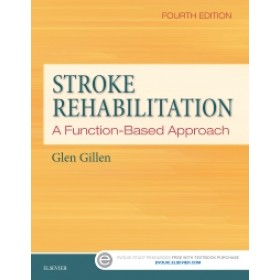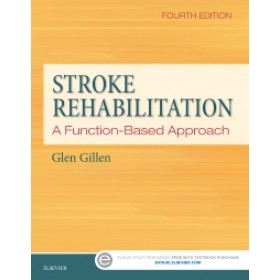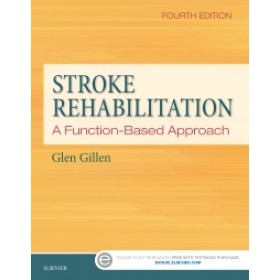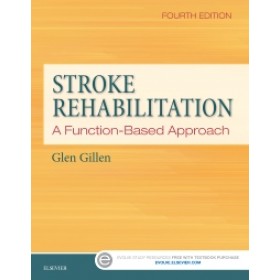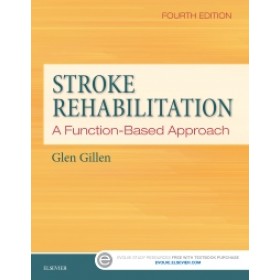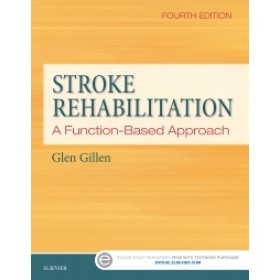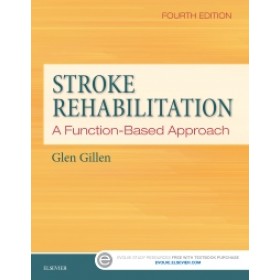Details
Stroke Rehabilitation: A Function-Based Approach, 4th Edition: Module 7
SKU: 787
by Glen Gillen, EdD, OTR, FAOTA
These courses are offered in cooperation with Elsevier Health and utilize the hardback textbook, “Stroke Rehabilitation: A Function-Based Approach, 4th Edition” by Glen Gillen, EdD, OTR, FAOTA.
Learn to confidently manage the growing number of stroke rehabilitation clients with these exciting new courses! Using a holistic and multidisciplinary approach, this text remains the only comprehensive, evidence-based stroke rehabilitation resource for occupational therapists. The new edition has been extensively updated with the latest research in assessment and intervention, along with more evidence-based research added to every chapter. As with previous editions, this comprehensive reference uses an application-based method that integrates background medical information, samples of functionally based evaluations, and current treatment techniques and intervention strategies.
Module 1: covers pathophysiology, medical management and acute rehabilitation of stroke survivors, psychological aspects of stroke rehabilitation and improving participation and quality of live through occupation.
Module 2: covers the task-orientated approach, activity-based interventions in stroke rehabilitation and approaches to motor control dysfunction.
Module 3: covers trunk control, balance impairments and vestibular rehabilitation when performing stroke rehabilitation.
Module 4: covers upper extremity function and management and rehabilitation technologies to promote upper limb recovery after a stroke.
Module 5: covers edema control, splinting applications and functional mobility after a stroke.
Module 6: covers gait awareness, managing visual and visuospatial impairments to optimize function in patient who have had strokes and the impact of neurobehavioral deficits on activities of daily living.
Module 7: covers enhancing the performance of activities of daily living after a stroke, the treatment of cognitive-perceptual deficits using a function-based approach and managing speech and language deficits after a stroke.
Module 8: covers driving and community mobility as an instrumental activity of daily living, parenting after stroke, dysphagia management and sexual function and intimacy after a stroke.
Module 9 covers adaptations for activities of daily living, leisure activity participation after stroke, seating and wheeled mobility prescription and home evaluation and modifications for stroke patients.
Course Length: 8.0 contact hours
Instructional level: Intermediate
This package contains the reading and testing materials for Module 7 only.
Stroke Rehabilitation: A Function-Based Approach, 4th Edition: Module 7
Course Goals and Objectives:
Course Goals: This course is intended to instruct the student, through self-paced study, on enhancing performance of activities of daily living after stroke, the treatment of cognitive-perceptual deficits using a function-based approach and managing speech and language deficits after stroke.
Student Objectives:
At the end of this course, the student will be able to:
1. Identify how to implement the occupational therapy process in a manner that is client centered and is based on top-down reasoning and an occupation-based and/or occupation-focused approach to evaluation and intervention.
2. Identify components of the Assessment of Motor and Process Skills (AMPS) test.
3. Differentiate between the 4 levels of challenge for personal activities of daily living and instrumental activities of daily living.
4. Differentiate between ADL Motor and ADL Process Skills when using the Assessment of Motor and Process Skills (AMPS) test.
5. Differentiate between 12 ADL task domains and the appropriate ADL task actions according to the ADL Taxonomy.
6. Analyze from case studies, the results of AMPS test data and the likelihood for the need for assistance in community living
7. Identify the 4 different models of practice from the Occupational Therapy Intervention Process Model.
8. Identify which treatment approaches have the greatest impact on the stroke survivor’s quality of life.
9. Analyze the differences between the remediation and adaptation approaches of stroke rehabilitation.
10. Identify 12 neurobehavioral impairments relating to the task of tooth-brushing.
11. Identify 6 assessments used to assess unilateral neglect.
12. Differentiate between the 4 types of transfer of learning identified by Toglia.
13. Identify the rationale for specific prompting procedures in stroke rehabilitation.
14. Identify components of a protocol for strategy training for those living with functional deficits secondary to apraxia.
15. Identify 3 types of neglect with spatial aspects and appropriate functional activity difficulties for each type.
16. Identify topographic disorientation and a treatment technique to address this issue.
17. Identify the 4 stages of memory
18. Identify implicit memory.
19. Discriminate between the 4 executive functions related to an everyday living activity such as making a salad.
20. Identify the incidence and prevalence of communication disorders after stroke.
21. Identify the 3 general categories of communication disorders found in stroke patients
22. Identify the symptomology of Broca’s Aphasia.
23. Identify diadochokinesis.
24. Differentiate between Wernicke’s , Conduction, Transcortical Sensory, Anomic and Global aphasias.
25. Identify the characteristics of Right Brain Syndrome.
26. Differentiate between vascular dementia and Alzheimer’s dementia.
